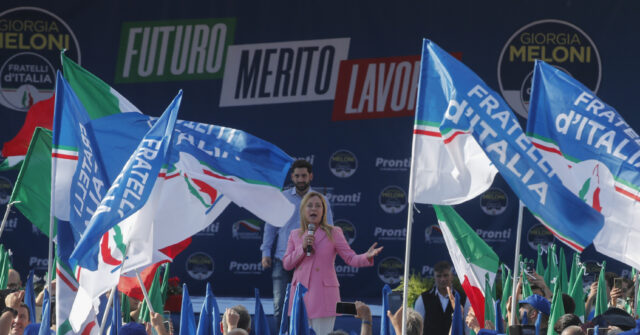

Italians are voting Sunday in an election which could change the face of the European Union, with a right-populist coalition of anti-mass migration, eurosceptic parties tipped to win a parliamentary majority.
Giorgia Meloni’s Brothers of Italy (FdI), Matteo Salvini’s League (Lega), and three-time former prime minister Silvio Berlusconi’s Forza Italy are tipped by pollsters to come out on top in Sunday’s election, paving the way for the first government in a national conservative vein similar to Poland and Hungary in Western Europe.
All three party leaders are eurosceptics, if not open “Italeavers” — the Italian version of Brexiteers — with even the relatively centre-right Berlusconi, 85, having hardened his stance on the EU after senior officials, in his view, successfully conspired to have him ousted as premier in 2011, with a technocratic government headed by Mario Monti, a former European Commissioner, replacing his without an election.
The right-populist coalition last ran for office in 2018, but the breakout stars of that election were the left-populist Five Star Movement (M5S).
Salvini’s League, which came in second, ultimately formed a coalition government with M5S, with Salvini taking up the post of Minister of the Interior and drastically reducing illegal immigration — and, consequently, drownings — by, for the most part, closing Italy’s ports to NGOs operating migrant transport ships in the Mediterranean.
This government had collapsed by 2019, however, the M5S replacing the League with the left-establishment Democratic Party (PD) — a coalition which allowed illegal immigration to soar once again before it also collapsed amid the fallout of the Chinese coronavirus pandemic, giving rise to a technocratic government.
Giorgia Meloni’s Brothers of Italy, the weakest party of the right-wing coalition in 2018, securing under five per cent of the vote, was the only coalition member — indeed, the only major party in Italian politics as a whole — to oppose this technocratic government, and in particular the harsh restrictions and mandates imposed on the unvaccinated, which Meloni denounced as “state blackmail”.
Consequently, the Brothers’ popularity has soared, and it is expected to become the country’s largest single party by vote share.
Islam, Meloni: Da Corte di Strasburgo prove generali di sottomissione, Italia protesti contro sentenza pro-Sharia https://t.co/41lxcyAOQX pic.twitter.com/vzpuwwDndO
— Fratelli d’Italia 🇹 (@FratellidItalia) December 30, 2018
More broadly, the Brothers of Italy campaign on a national conservative platform, with the Trump-like slogan ‘Italy and Italians First’ joining the more traditional ‘God, Homeland, Family’ as its key pitch to voters.
Meloni, like Salvini, favours firm action against illegal immigration, the defence and promotion of the nation’s Christian character and identity in the face of “Islamisation” and “nihilistic globalist elites, driven by international finance,” regulating against Big Tech censorship, and a Hungary-like series of tax cuts to support family formation as a means to reverse demographic decline — Italy has more over-80s and over-65s than any country in Europe — without resorting to open borders.
One possible area of tension within the right-wing coalition could be the Russo-Ukrainian war, with Berlusconi and Salvini seen as sympathetic to Russia, if not the Russian invasion of Ukraine.
Berlusconi, who cultivated a close personal relationship with Vladimir Putin as premier which he maintained following his ouster, recently suggested that the Russian leader had been “pushed” into attempting to “replace the Zelensky government with decent people” by generals and other influential figures within the Russian establishment.
Salvini, concerned by the impact of the energy crisis on ordinary Italians, has meanwhile suggested easing back on participation in the Russo-Western sanctions war if it appears to be inflicting more self-harm than damage to Putin.
Meloni, however, has kept up a consistently firm line against the Kremlin since its general invasion of Ukraine in February.
Meloni: Establishment Left Is Afraid of Right-Wing Election Victory This Weekend https://t.co/kfgw5ekmWo
— Breitbart London (@BreitbartLondon) September 24, 2022
The prospect of Italy, a founder-member of the European Union’s predecessor organisations, pursuing a pro-sovereignty, anti-mass migration model of governance has spooked many in the European Union establishment, with Ursula von der Leyen, the President of the European Commission, threatening that “[i]f things go in a difficult direction, I’ve spoken about Hungary and Poland, we have tools.”
However, while Italy does not enjoy the influence of France and Germany, the EU’s dominant member-states, in Brussels, it is significantly larger than the Central European countries in terms of not only its economy and population but also its share of representation within the EU institutions, and — supported by the conservative governments of those Central European countries — it will likely prove much harder to try and corral.
“These are disgusting words, the threatening tone is unacceptable,” said Salvini of the Commission president’s implied threat, adding that his party would be proposing a measure of censure against the German.
The technocrat-in-chief attempted to row back in short order, with a spokesman claiming it was “absolutely clear that the President did not intervene in the Italian elections” — although even the left-establishment Matteo Renzi, which is opposing Meloni and her partners in said elections, seemed to think otherwise.
“I tell the President, you must not enter into Italian issues in the slightest,” said the former prime minister, even as he said that his party was “for the United States of Europe”.
[embedded content]



